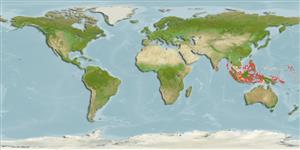>
Gobiiformes (Gobies) >
Gobiidae (Gobies) > Gobiinae
Etymology: Amblyeleotris: Greek, amblys = darkness + The name of a Nile fish, eleotris (Ref. 45335).
Eponymy: Surgeon Major H R F Fontanes was a Dutch East Indian Army physician in Macassar, Celebes. He provided a collection of fishes from Bulucumba, Sulawesi, Indonesia, presumably including the type of the goby. (Ref. 128868), visit book page.
More on author: Bleeker.
Environment: milieu / climate zone / depth range / distribution range
Ecologia
marinhas; estuarina associadas(os) a recifes; intervalo de profundidade 5 - 30 m (Ref. 90102). Tropical; 19°N - 9°S
Western Pacific: Sumatra to the Moluccas, north to the Philippines; Palau in Micronesia. Reported from Papua New Guinea (Ref. 6771) and south of Taiwan (Ref. 5193).
Tamanho / Peso / Idade
Maturity: Lm ? range ? - ? cm
Max length : 25.0 cm SL macho/indeterminado; (Ref. 48637)
Descrição suscinta
Chaves de identificação | Morfologia | Morfometria
Espinhos dorsais (total) : 7; Raios dorsais (total) : 15; Espinhos anais: 1; Raios anais : 16 - 17. Characterized by whitish body color; head and body with five brown bars; small orange spots on head; first dorsal fin with large dark blotch; pelvic fins fully united with well developed frenum; predorsal scales extending forward to less than orbit diameter from interorbital space; longitudinal scale series 110; greatest depth of body 5.8-6.3 in SL; pointed caudal fin, longer than head (Ref. 90102).
Inhabits silty inshore bottoms, deep coastal mud slopes and also occurs in estuaries in muddy channels (Ref. 48637). Also found in sand bottoms of lagoons and sheltered reefs in 5-30 m (Ref. 90102).
Ciclo de vida ou comportamento de acasalamento
Maturidade | Reprodução | Desova | Ovos | Fecundidade | Larvas
Myers, R.F., 1991. Micronesian reef fishes. Second Ed. Coral Graphics, Barrigada, Guam. 298 p. (Ref. 1602)
Status na Lista Vermelha da UICN (Ref. 130435: Version 2024-1)
Ameaça para os humanos
Harmless
Uso pelos humanos
Pescarias: espécies comerciais; Aquário: Espécies comerciais
Ferramentas
Relatórios especiais
Baixar XML
Fontes da internet
Estimates based on models
Preferred temperature (Ref.
123201): 28.4 - 29.3, mean 28.8 °C (based on 1002 cells).
Índice de diversidade filogenética (Ref.
82804): PD
50 = 0.5000 [Uniqueness, from 0.5 = low to 2.0 = high].
Bayesian length-weight: a=0.00724 (0.00339 - 0.01546), b=3.10 (2.92 - 3.28), in cm total length, based on LWR estimates for this (Sub)family-body shape (Ref.
93245).
Nível Trófico (Ref.
69278): 3.5 ±0.4 se; based on size and trophs of closest relatives
Resiliência (Ref.
120179): médio(a), tempo mínimo de duplicação da população 1,4 - 4,4 anos (Preliminary K or Fecundity.).
Fishing Vulnerability (Ref.
59153): Low vulnerability (21 of 100).
